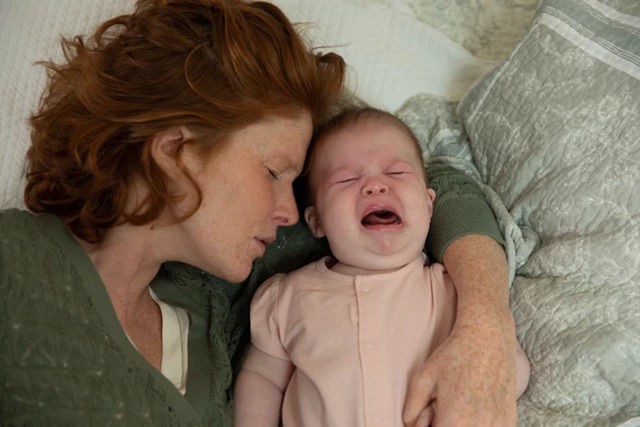If you suspect that your baby’s prolonged crying, gas and difficulty sleeping are due to colic, you should speak to your public health nurse, pharmacist or GP to confirm the diagnosis. It’s thought to be caused by their developing digestive system and will usually resolve itself after a few months. In the meantime, there are solutions that will help to soothe colic symptoms. These range from techniques for comforting your crying baby to medical treatments for the suspected root causes of colic.
Colic Relief

Soothing your colicky baby
Comforting your baby
When it comes to comforting your baby, there is no ‘right’ way – it completely depends on what they respond to. Below are a few tried-and-tested methods that mums have found helpful:
- Soothe them with gentle rocking motions
- Try holding your baby in different positions
- Calm them with white noise (e.g. the hairdryer, vacuum cleaner)
- Give them a warm bath and then wrap them in a warm blanket
- Take a walk around the block with them in the pram
- Take them for a drive in the car
- Give them a gentle stomach or back rub
- Ask your health visitor about baby massage techniques
Colic relief
If you suspect your baby may have colic, watch our short video for tips and advice to help manage their symptoms.
How to relieve colic

- Although there is no proven colic treatment, here are a few practical solutions that can help ease symptoms.
- Sit your baby upright during feeds to prevent them from swallowing air
- Use a ‘fast-flow’ teat if you are bottle feeding – small holes in the teat can lead to swallowing too much air while feeding
- If you’re formula feeding, speak to your health visitor, GP or pharmacist about suitable specialist formulas for the dietary management of colic
- Always wind your baby after a feed
- If you are breastfeeding, avoid too much spicy food, alcohol, tea, coffee and other caffeinated drinks
Looking after yourself
Colic can be physically and emotionally draining for parents, but you’re not alone. Around 20% of parents will go through the same difficult time. You may find that the tiredness and added stress can put pressure on home life, so it’s important that you get support. If you’re finding it hard to cope, here are some ways to help yourself:
- Talk to your public health nurse, pharmacist or GP, not just about your colicky baby, but about how you’re feeling
- Ask your friends and family for help so that you can have a break
- Try to rest as much as possible when your baby is sleeping
- Take a short walk with your baby; a change of scenery can really help both of you
- Get out and about and meet mums in the same situation who you can talk to
Don’t forget, if you’re finding it difficult to cope with your baby’s colic and need someone to talk to, our expert careline team are available 24 hours a day, 7 days a week.
Next Steps
- Try the comforting techniques to see which work for you, and then stick with them
- Speak to your healthcare professional to confirm the diagnosis and discuss nutritional solutions available
- Trial suggested colic remedies and see if any have a positive effect on symptoms
- Look after yourself, try to rest and remember not to blame yourself
Related articles

Get in touch with our Careline experts
Our nutritionists and feeding advisors are always on hand to talk about feeding your baby. So if you have a question, just get in touch
Important notice
Breastfeeding is best for babies and provides many benefits. It is important that, in preparation for and during breastfeeding, you eat a varied, balanced diet. Combined breast and bottle feeding in the first weeks of life may reduce the supply of your own breastmilk, and reversing the decision not to breastfeed is difficult. The social and financial implications of using an infant formula should be considered. Improper use of an infant formula or inappropriate foods or feeding methods may present a health hazard. If you use an infant formula, you should follow manufacturer’s instructions for use carefully – failure to follow the instructions may make your baby ill. Always consult your doctor, midwife or health visitor for advice about feeding your baby.




